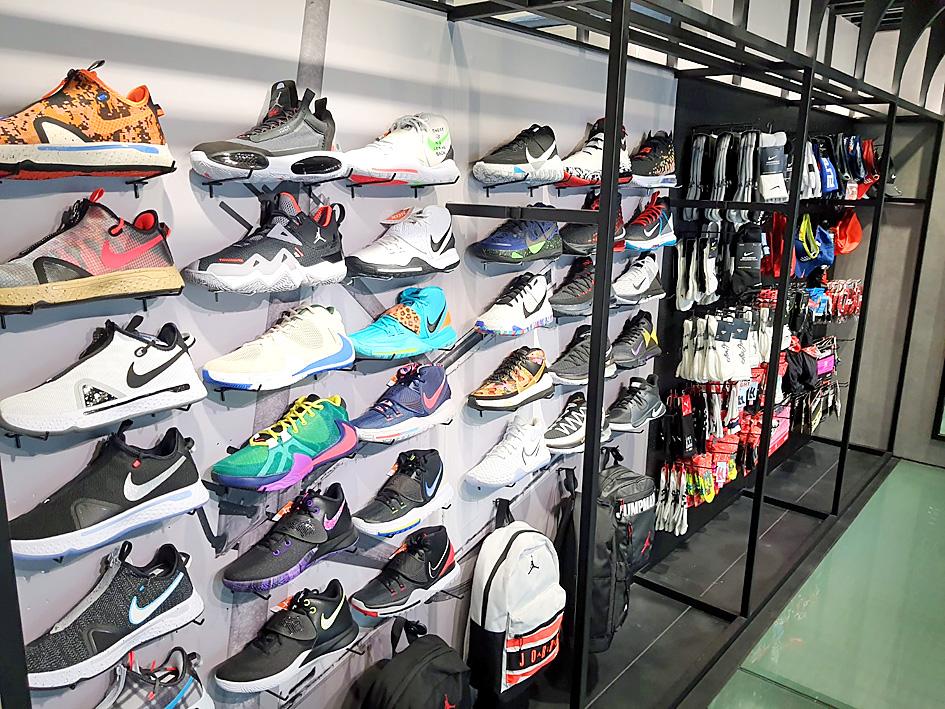Shoemaker Pou Chen Corp (寶成工業) on Friday reported net profit of NT$4.64 billion (US$155.67 million) in the first quarter of the year, down 26.1 percent from a year earlier, but still the second-highest net profit for the period in the company’s history.
The world’s largest contract maker of branded athletic and casual footwear also has investments in retailing and land development, as well as in financial services providers such as Nan Shan Life Insurance Co (南山人壽).
Pou Chen said the lower profit was largely due to fewer investment gains from Nan Shan, compared with a year earlier. The company booked NT$2.63 billion in investment gains from Nan Shan for the first quarter, down from the NT$4.69 billion it booked over the same period last year, it said in a statement.

Photo: Hung Mei-hsiu, Taipei Times
As the company’s non-operating profit also declined by 28.2 percent year-on-year to NT$4.19 billion in the quarter from January to March, its earnings per share were NT$1.57, down from NT$2.13 a year earlier, the company’s financial report showed.
Gross margin was 24.1 percent, down from 25.7 percent a year ago, while operating margin dropped to 3.8 percent, from 4.8 percent, the report showed.
First-quarter revenue decreased 5.1 percent year-on-year to NT$67.26 billion, as its retail business in shoes and sports products was negatively affected by COVID-19 flareups in China, despite steady improvement in its shoemaking operations, Pou Chen said.
The company’s original equipment manufacturing (OEM) shoe business generated sales of NT$42.88 billion in the first quarter, up 10.7 percent year-on-year on the back of rising shipments and higher product prices, it said.
The company shipped about 70.9 million pairs of shoes last quarter, an annual increase of 3.8 percent, while average selling prices were US$19.65 per pair, higher than the US$17.79 a year earlier, it said.
The OEM shoe business for international brands such as Nike Inc, Adidas AG, Asics Corp, New Balance Athletic Shoe Inc, Timberland Co and Salomon SAS made up 63.8 percent of the firm’s total revenue last quarter, it said.
The majority of Pou Chen’s shoe production is in Vietnam, Indonesia and China, accounting for 35 percent, 49 percent and 10 percent respectively of the company’s total production last quarter.
Its retail business — operated by Hong Kong-listed subsidiary Pou Sheng International Ltd (寶勝國際) — saw sales decrease by 24.5 percent from the previous year to NT$24.14 billion, due to strict COVID-19 restrictions in China, Pou Chen said.
The retail business comprised 35.9 percent of Pou Chen’s revenue last quarter, it said.
As of the end of the first quarter, Pou Sheng operated 8,186 stores, compared with 8,417 a year earlier, Pou Chen said.

Vincent Wei led fellow Singaporean farmers around an empty Malaysian plot, laying out plans for a greenhouse and rows of leafy vegetables. What he pitched was not just space for crops, but a lifeline for growers struggling to make ends meet in a city-state with high prices and little vacant land. The future agriculture hub is part of a joint special economic zone launched last year by the two neighbors, expected to cost US$123 million and produce 10,000 tonnes of fresh produce annually. It is attracting Singaporean farmers with promises of cheaper land, labor and energy just over the border.

US actor Matthew McConaughey has filed recordings of his image and voice with US patent authorities to protect them from unauthorized usage by artificial intelligence (AI) platforms, a representative said earlier this week. Several video clips and audio recordings were registered by the commercial arm of the Just Keep Livin’ Foundation, a non-profit created by the Oscar-winning actor and his wife, Camila, according to the US Patent and Trademark Office database. Many artists are increasingly concerned about the uncontrolled use of their image via generative AI since the rollout of ChatGPT and other AI-powered tools. Several US states have adopted

A proposed billionaires’ tax in California has ignited a political uproar in Silicon Valley, with tech titans threatening to leave the state while California Governor Gavin Newsom of the Democratic Party maneuvers to defeat a levy that he fears would lead to an exodus of wealth. A technology mecca, California has more billionaires than any other US state — a few hundred, by some estimates. About half its personal income tax revenue, a financial backbone in the nearly US$350 billion budget, comes from the top 1 percent of earners. A large healthcare union is attempting to place a proposal before

KEEPING UP: The acquisition of a cleanroom in Taiwan would enable Micron to increase production in a market where demand continues to outpace supply, a Micron official said Micron Technology Inc has signed a letter of intent to buy a fabrication site in Taiwan from Powerchip Semiconductor Manufacturing Corp (力積電) for US$1.8 billion to expand its production of memory chips. Micron would take control of the P5 site in Miaoli County’s Tongluo Township (銅鑼) and plans to ramp up DRAM production in phases after the transaction closes in the second quarter, the company said in a statement on Saturday. The acquisition includes an existing 12 inch fab cleanroom of 27,871m2 and would further position Micron to address growing global demand for memory solutions, the company said. Micron expects the transaction to